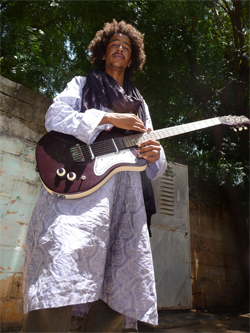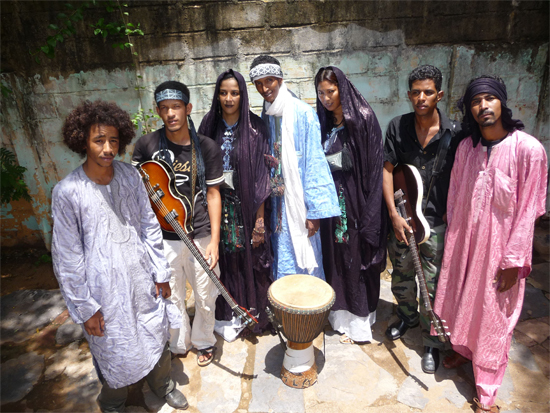Ousmane Ag Mossa holds up a photograph of himself as a boy, pulling a tiny toy truck on a string across golden sand. Behind him, low adobe houses, walls and the odd green bush recede into the Saharan sky. "This is where I first saw the light," he says.
Mossa was born in 1985, when the worst drought in decades swept through sub-Saharan Africa. But while the attention of the world’s news organisations focused on the plight of Ethiopia, thousands of miles to the west the changing climate was having a catastrophic effect on one of Africa¹s most ancient tribes. They were Mossa¹s people, the nomadic Tuareg, thought to have been driving their livestock from well to well for thousands
of years.
Mossa is singer, guitarist, chief songwriter and leader of desert blues group Tamikrest, who sing in Tamashek, the ancient language of the Tuareg people. Tamikrest were ‘discovered’ at the 2008 Festival of the Desert by Chris Eckman and Chris Brokaw, American musicians who have collaborated with the likes of the Bad Seeds, Sonic Youth and the Willard Grant Conspiracy. In fact, Eckman was so impressed that he returned to Africa to produce Tamikrest¹s debut album, Adagh.
Visa problems mean that while I’m looking out over London
from a palatial hotel suite, Mossa is talking to us via Skype from Germany, base of the Glitterhouse label that released Adagh. "I’m on another planet, compared to Mali and the desert," Mossa says through a fug of cigarette smoke.
Four years after the 1985 drought, Mossa’s mother died. A year later, the Tuareg rose up in rebellion against the Malian government and the people were forced to return to their wandering ways. "All Tuareg were considered the enemy. It didn’t matter if you were a woman, a child, a young man –
everyone was in danger," Mossa explains. "People abandoned villages, hid in the hills or crossed the border to Algeria, out of the reach of the Malian army."
In 1992, an agreement was signed in which the Malian government granted rights to the Tuareg but, feeling that these promises were not being kept, the revolt reignited in 2006.
"My village was the epicentre of the revolt, because one of the leaders, Ibrahim Ag Bahanga came from there," continues Mossa. "My family had to abandon their house and move to Libya. I went to southern Algeria. The Malian army and authorities hold my village in deep suspicion."
It¹s worth noting that Ag Bahanga is a deeply controversial figure in the Tuareg insurgency, even seen by many of his own as an extremist. Nevertheless, Mossa defends him: "I supported what Ag Bahanga is doing because it¹s not banditry; he isn’t doing it for himself to rob people and become richer. He was doing it to get the rights that had been promised to Tuareg people in the peace accords of 1992 and various other agreements that haven’t been respected. What do you want us to do? Wait until the end of the world for these things to become a reality?"
Mossa’s awareness of his people¹s plight was first put into a musical context after hearing Tuareg group Tinariwen, who formed in 1979 as an act of rebellion against the Malian government. "A lot of young people created this music of exile on the guitar," he explains. "It was two things: on one hand, blues for your homeland – homesickness for your family, the desert and
the life that¹s been taken away. But it was also about persuading all your friends and the others in the desert to wake up and realise what is happening to them."
The young Mossa related to Tinariwen on a deep level. "It’s important to realise that Tinariwen was such a big influence on us because they sang about our daily experiences," he enthuses. "Their songs were a mirror to our lives. It was really like someone sitting next to you talking about your reality. This led me to want to play the guitar, so I could join in their
song. I felt it was my song as much as theirs."
Mossa had access to a guitar from a young age after hogging the one instrument in the village, which had been paid for by a French NGO. "We used to explore music with that guitar, and I would sit there and try and work out songs by Tinariwen, the words, the rhythms. I started by adapting what I already knew, stretching the words to fit my situation."
In fact, Mossa had never really intended to be a musician, believing there were better ways to further the cause of the Tuareg people: "My first ambition was to become a lawyer, as there are hardly any Tuareg lawyers. I thought that I could be an advocate for the cause, but with all the upheavals following my studies, it became impossible. And I realised that music could do the same thing, so I started to write songs."

Asked what influences aside from Tinariwen went into the music of Tamikrest, Mossa says Mark Knopfler and Bob Marley. "I never really understood Marley’s words, but the music was so powerful that it made sense to me." You could argue that there’s some of Marley¹s spirit in much of Adagh. Tracks like ‘Aicha’ possess a dub-like groove, while in ‘Amidini’ you can see why they’ve been named ‘sons of Tinariwen’. Yet despite the glorious feel of ‘Tamiditin’, with its yelps and handclaps, or the woozy ‘Tidite Tille’, Mossa says that Tamikrest’s music is directed towards one serious end. "If I was asked to sum up my purpose and my dream, it would be to help the Tuareg obtain the freedom, independence and respect that all the other Malians enjoy," he says. "When I first visited the south of Mali, I found that the story I had always been told by the Malians wasn¹t true. They always said, ‘We are a poor country, so why are you asking for things that we can’t provide?’ But there were clinics, tarmac on the roads, investment that we didn’t know in the north. This was not right and it must change. Of course I have ambitions as a musician, but above all that is this desire to communicate the problems of the Tuareg to the rest of the world."
"We are a hidden people," he continues. "A lot of Malians ask, ‘Who are these people? Are they Algerians? Are they Arabs?’ The truth is that the roots of the Tuareg people and culture go back for thousands of years. Hopefully with the success of Tinariwen and Inshallah Tamikrest there will be a raising of interest."
Mossa says he¹s aware that some of the southerners’ success has raised awareness of Tinariwen, and hopes that this might help Tamikrest’s message to spread the rest of Mali. "People in the arts are starting to receive heat back from Europe saying, ‘Oh yes, these funny Tuareg bands are becoming successful, maybe we should listen to them,’" he says.
But does this mean he feels optimistic about how much Tamikrest and other Tuareg groups can achieve politically? "To be honest, the future frightens me," Mossa says sadly. "Honestly nothing has changed since the first Tuareg rebellion in 1963. Hope has not left me, but I can’t see the beginnings of a sustainable new life. I have the impression that we¹re turning in circles
rather than moving forward."
This article was originally published in the always excellent pages of The Stool Pigeon. The latest issue, also featuring Alan Moore, Chrome Hoof, Robyn and Mike Patton, is available now.




